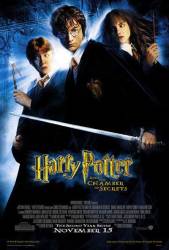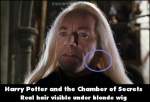Question: In a deleted scene Lockhart gives a quiz in his first class, and after it he mentions Hermione knowing his greatest ambition, Susan Bones smiles at Hermione. Why?
Chosen answer: There is not a particular reason. All the girls had huge crushes on Gilderoy Lockhart. Susan Bones also is taken with Lockhart and she is just enjoying the attention that Hermione is receiving.
Question: Why does Professor McGonagall give Lockhart the task of catching the monster? She and the other teachers don't like him or trust in his abilities.
Answer: Minerva told Lockhart to kill the basilisk because the teachers all know he's basically an incompetent fool and would most likely run or do something stupid which they can't afford at that time. So they wanted to get him occupied while they safely evacuate the students from Hogwarts by taunting him into seeking and killing the monster in the Chamber as she says, "That's got him out from under our feet." Most likely, they might have already known that he would run away as he obviously has a cowardly and pretentious character.
Question: When Harry and Ron show up late at Hogwarts and are caught by Filch, why does Filch take them to Snape and not McGonagall? I know Filch does not like any of the students because he's a Squib (a pureblood with no magical power) and he knew Snape would tell them off severely, but as Ron and Harry are Gryffindor students, they should have been taken to McGonagall no questions asked.
Chosen answer: Filch wanted the boys to be punished and he knew Snape would inflict a harsher punishment than McGonagall.
Question: On the site, there's a mistake submitted about when they all say 'no' in unison. Can anyone tell me what part this is?
Answer: Just after Harry has his experience with Tom Riddle 50 years in the past, Hermione, Ron and Harry are walking outside on the grounds discussing it, when Hermione suggests speaking with Hagrid about it, and Ron remarks, "That'd be a cheerful visit. Tell us, have you been setting anything mad and hairy loose in the castle lately?" Hagrid suddenly shows up behind the trio and asks, "You wouldn't be talking about me, now would you?" To which all three promptly reply, "No!"
Question: Why did Fudge wait so long to arrest Hagrid? It sounds to me he didn't care that Hagrid's record was against him and that he only arrested Hagrid so Fudge would look like he knew what he was doing.
Answer: He probably wouldn't have arrested Hagrid, but he was pressured by Lucius Malfoy who could have used his wealth and influence to have Fudge removed from office. Hagrid was a convenient scapegoat to make it look like the Ministry was making progress in the investigation. Of course, Malfoy was orchestrating all this solely to aid Voldemort.
Answer: Lucius had nothing to do with getting Hagrid arrested. He was only there because he was looking for Dumbledore to get rid of the headmaster. It wasn't to aid Voldemort; it was to rid the school of Muggle-borns. He had no idea the diary had a fragment of Voldemort in it.
Question: Snape promised Dumbledore that he would protect Harry. When Snape found out that the flying car was seen by Muggles, he tells Harry and Ron that he'll have them both expelled. Why would Snape expel Harry? Doesn't he realise that if he expels Harry, he won't be able to protect him?
Answer: What Dumbledore or Snape say and what actually happens are two different things. Dumbledore may threaten expulsion, but his intent is to scare them into behaving. It's doubtful he ever would, particularly Harry. Snape is always torn between his promise to protect Harry and his hatred for him. He is usually being reactive, and his misplaced animosity is irrational because it is Harry's father, James, that he actually despised. He also loved Harry's mother, so he would always protect Harry because of that. Also, one professor cannot expel a student. There would be an official hearing, and Dumbledore would make the final decision. As the other answer pointed out, Harry would still be protected by the Order. He is also magically protected by his mother's blood until he turns 17 years old, as he is when he spends summers at the Dursleys.
Answer: Snape, and others, could certainly watch and protect Harry outside of Hogwarts. Members of the Order of the Phoenix watch him later on, before his fifth year of school begins. Also, in the "Chamber of Secrets" book, Dumbledore tells Harry and Ron, "If you do anything like this again, I will have no choice but to expel you." Even he considered the possibility of Harry not finishing school.
Question: What is the letter of Argus about?
Answer: The movie glossed over this. Argus Filch was a squib (a non-magical person born into a wizard family). In the hope of somehow developing magical powers, he'd sent for a home correspondence course on learning magic spells. Filch was embarrassed when Harry happened to pick up his dropped letter, realizing that this probably revealed what he was, though almost every student knew this about him.
Question: If the Basilisk snatched Ginny and took her to the chamber, then why doesn't she have teeth marks when they show her lying on the chamber floor? Surely the Basilisk didn't drag her, because it doesn't obviously have arms.
Answer: The comment that she was "snatched" was a generalization used by the Hogwarts staff and not a literal description of her physically being taken. Riddle was able to control Ginny through the diary, putting her into a trance and commanding her what to do. She most likely was instructed to follow the basilisk into the Chamber of Secrets.
Question: Why does the basilisk only obey Riddle? Was it trained or bred to?
Question: When Hagrid says that he went to Knockturn Alley for flesh-eating slug repellent (after Harry asks why he was there), he seems to hesitate first. Is he lying?
Answer: He was being evasive rather than lying. Hagrid was there to legitimately buy the flesh-eating slug repellent, and he was alarmed to find Harry in such a dodgy place, but he was not above engaging in "under-the-table," business transactions, particularly when dealing with magical creatures. He'd previously come into possession of a dragon's egg, resulting in a hatchling that was illegal to own. Hagrid was also seen quickly covering up another one of his creatures (in Prisoner of Azkaban) when Dumbledore and Fudge arrived at his hut. It wasn't illegal to be in Knockturn Alley, but judging by Hagrid's reaction, he'd probably conducted some unknown business that he didn't want Harry or anyone else to know about.
Question: Was Hermione crying in Hagrid's hut?
Question: This is about the deleted scene that takes place in the Borgin and Burkes shop. What is the object that Mr. Malfoy says is not for sale? And why bring it to the shop at all if he doesn't want to sell it?
Answer: It's never explained what it is or why Malfoy brought it with him. He may just have wanted to see if the clerk might be interested in it, in case he decided later to sell it and could therefore demand a higher price. It could be the diary, and that it's being alluded to that it belongs to him here.
Question: Throughout all the movies, there are a few times when people are shown using magic without a wand, so what is the point of taking away someone's wand (Hagrid) or casting the "Expelliarmus" spell?
Answer: Only the most skilled wizards (as well as some basic instinctive magic) can do magic without a wand. A wand is also necessary for a number of different spells. Notice how even Voldemort always uses both a wand and the incantation when casting the Killing Curse.
Question: A nit-picky question, but why did Hermione tear out a book's page of information about the basilisk? I have read the novel and Professor McGonagall says that she was found *near* the library when petrified, not *in* it. So I am puzzled about why she would want to damage a book instead of borrowing it.
Answer: A number of books in the library were restricted - either they were off limits to students or they could be read but not checked out. This was probably such a book. Hermione loved books, and would not normally approve of damaging them, but this was too important to her, and she needed that specific information. Of course, it also serves the overall plot because Harry finds the page after she's been petrified, and he is able to glean clues from it.
Question: How did Tom Riddle get Ginny into the Chamber of Secrets? Did he take her there by force or did he possess her again and she went there in a hypnotised state? I'm asking since I thought after she threw away his diary, she was no longer possessed by him and when Harry meets him, he's becoming less of a memory, and more real.
Chosen answer: Ginny took the diary from Harry's dormitory, she's the one who made the mess and took it. Riddle then possessed her with the diary again, told her to write her own death message on the wall, then told her to come down the chamber.
Question: Do some Hogwarts students stay at the school during the summer break? I ask because in the flashback scene, Tom Riddle tells Dumbledore that he will have nowhere to go if the school closes. But he is sixteen, so where has he gone during the summer breaks of his previous school years?







Answer: The Malfoys would have had no concerns about discussing anything within earshot of their house elves. Dobby may very well have overheard the Malfoys' conversations. House elves are magically bound to guard everything about their masters' secrets. Breaking that would result in severe punishment or death. Dobby circumvented this restriction as much as he possibly could to warn and protect Harry.
raywest ★